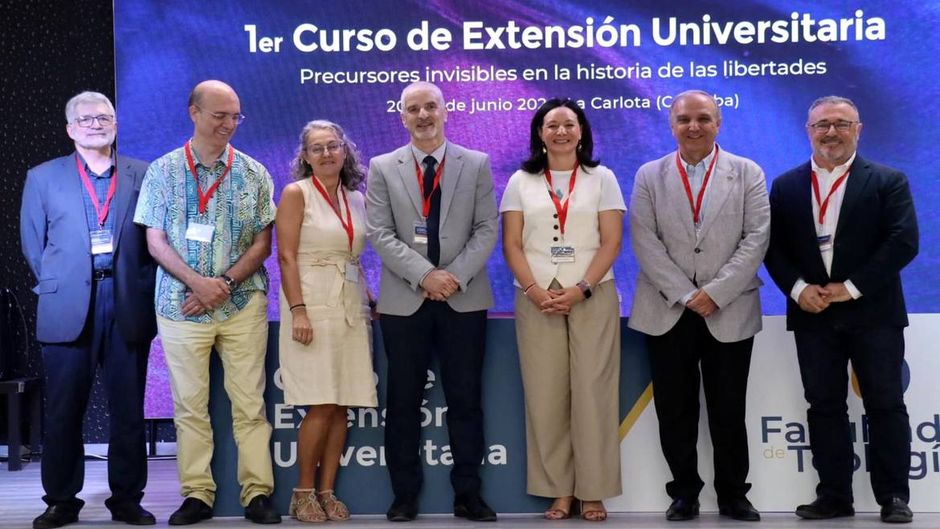The fight for freedoms of Spanish Protestants becomes visible at the university
Political leaders support a course on Protestantism and democratic freedoms. The new democratic memory law “will include the Spanish Protestants”.
Protestante Digital · CORDOBA · 24 JUNE 2024 · 19:30 CET

The university extension course Invisible precursors in the history of Spanish democratic freedom (Protestantism, a promoter of democratic freedoms in Spain) was recently held at the Faculty of Theology of the Assemblies of God, in the Spanish city of Cordoba.
Organised by the faculty and the Spanish Evangelical Alliance, it was supported by the Evangelical Council of Andalusia (CEAA), the regional council of Cordoba (CEPC), the Secretary of State for Democratic Memory, the City Council of Cordoba and the Andalusian regional government.
Fernando Martínez López, secretary of state for Democratic Memory, inaugurated the course and announced that as part of the law on democratic memory “we are carrying out a census of victims of the Franco regime, which includes Spanish Protestants”.
“It is difficult to gain freedoms and they can be lost in an instant; [...] Memory is not about revenge, but remembering in order to avoid making the same mistakes again. That is why we are going to keep you in mind, who were pioneers during the Republic in the fight for freedoms, especially of thought and religion”, said Martínez López.

Acceptance and integration
After his words and the greetings from the representatives of the different entities, there were three lectures.
In the first one, the secretary general of the Spanish Evangelical Alliance (AEE), Xesús Manuel Suárez , addressed the importance of the acceptance and integration of dissidents, since they are the ones who transform their environment and society.
He put the example of John Hus, burned at the stake as a heretic and precursor of the Protestant Reformation, who said: “You can burn a goose (hus in Czech) but in a hundred years a swan will rise up with a song that you will not be able to silence”, which was fulfilled in Martin Luther a century later.
He also recalled and detailed the Protestant resistance and their fight for freedoms in history and in Spain, “not only religious freedom, but also freedom of conscience and expression, which included all citizens”.
Persecution
Historian Evangelina Sierra explained how from the Inquisition to the Francisco Franco regime (with the exception of the two Republics), the national Roman Catholic system created a social network in Spain from which it was impossible to escape either in life or in death (the bodies of Protestant children and adults who had been baptised before their conversion were claimed by the Roman Catholic Church).
Those who did not fall under its tight control were singled out, despised, underestimated, without any possibility of social advancement. Christians outside the Roman Catholic system could not marry or register their children in the civil registry, and at the worst moments they were retaliated against, tortured and some even killed.

Protestant background
Finally, professor and historian Antonio Simoni explained the unusual Protestant background of La Carlota, a village near Córdoba created by king Charles III.
Due to a lack of resources, 7,000 European settlers were brought to populate it, offering land and houses. The recruitment rules required them to be Roman Catholics, but in the absence of Catholics, Protestants were used in disguise, and they made up 60-90% of those who finally arrived; four to six thousand people, mostly from Germany and Alsace.
The Inquisition then moved to La Carlota (something unique in history) and the oppression and persecution began, forcing the Protestants to renounce their faith, which caused many to return on foot to Germany. However, their work ethic, Christian values and customs still live on in the town.
Institutional support
Rafi Crespín, secretary general of the socialist party (PSOE) in Cordoba, MP in Congress and president of the Territorial Policy Commission of the Lower House of Parliament, took part in the closing ceremony.
Crespín received a gratitude letter, and a study of the genealogy of Crespín's family name, carried out by Simoni, which ends by linking him to the settlers of La Carlota.
His final words were of recognition and his wish for it to be repeated in the future.
One more year
Learn all about our #OneMoreYearEF campaign here (English).
Published in: Evangelical Focus - europe - The fight for freedoms of Spanish Protestants becomes visible at the university
